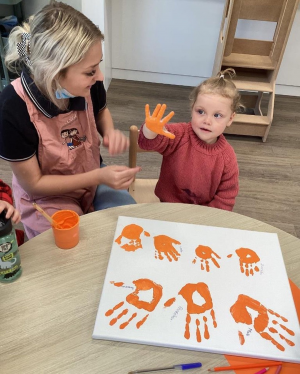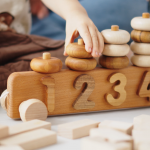Why listening is important in early childhood and learning.

Listening is one of the basic building blocks of language and communication. Particularly important in the early years of education, listening is an essential vehicle for learning. Strong listening and communication skills are essential to a child’s growth and their relationships, which is why we nurture these skills in the early stages of development.
The pedagogy of listening is at the heart and soul of Ascolta Early Learning & Care, empowering children to feel safe, secure, confident and heard. From a Reggio Emilia perspective, listening teaches educators just as much, if not more, than it teaches children. As shared by Carlina Rinaldi, their “whys” orient our search and give us the strength to find calm, honest and responsible answers.
Active listening is a proven strategy to grow trust and support the development of a strong relationship between an educator and child. Our educators practise active listening with each individual child. Giving their full attention to what a child is saying, doing and feeling, our educators are able to form personal relationships and to create an environment where children feel comfortable to open up and express themselves. This environment gives every child the best opportunity to feel safe and secure. At Ascolta Early Learning and Care, children are encouraged to be themselves, resulting in increased motivation to learn, play, explore and build relationships with others.
Communication is more than words; we call this whole body listening. Body language is often more important than speech when children are communicating. Active listeners can decipher the feelings and hidden meanings behind words by focusing on both the words, behaviour and the body language.
Here are our top tips to foster your child’s ability to communicate, develop confidence and build relationships using listening skills:
è Assist your child in feeling heard by increasing the level of attention focused on them while they are speaking or communicating.
è Help your child feel important, safe and equalise your communication by trying to get closer to their height so that you are eye to eye.
è Work on small changes to help with open body language. A small change to open your stance and posture, facing your child front-on will help your child to feel you are interested in what they are sharing.
è Provide a gentle visual guide to help your child focus by adjusting any physical obstacles between you such as cups, books – anything that could distract or get in the way of your child expressing themselves with their body language. This small act helps them to learn to improve their focus during communication.
è Hold eye contact with an open facial expression where possible.
è Try to allow the opportunity for your child to communicate in their own time where possible and to finish their sentences or find a word they are looking for. Time does not always permit this option and that is also an important learning for your child.
è Use affirmations or sounds to reinforce that you’re listening. This can include ‘mhmm’ sounds or nodding along.
Listening shows a child that what they think and say is important. This builds their confidence in their ability to communicate with others, which will benefit children in all areas of life.
Listening can be about more than sounds and body language, adding empathy to your toolkit can improve the way you communicate with your child. Empathy also teaches them about the feelings of others and how to better understand the world around them. Some great examples of modelling empathy when communicating with your child are; putting feelings into words, encouraging conversations about feelings and accepting while acknowledging your child’s feelings.
At Ascolta Early Learning & Care, listening is at the core of our every moment. To see or educators listening and tuned in, we welcome you on a tour of our centre.
THE IMPORTANCE OF LISTENING AT ASCOLTA EARLY LEARNING AND CARE
Listening is when we understand that integrated knowledge unites our community
Listening indicates the need to listen, and to be listened to
Listening recognises diverse languages, codes and symbols people use to express themselves
Listening means to listen to yourself
Listening takes time
Listening helps us ask good questions
Listening allows powerful observation
Listening fosters emotion
Listening can be active
Listening is not easy
Listening helps create relationships
Listening involves being aware
Listening is being open to uncertainty, diversity, and doubt

